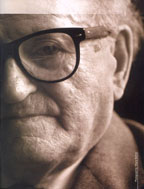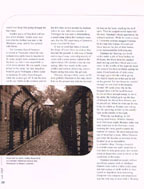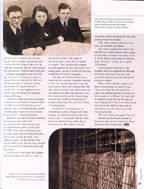




To Hell and Back
By MAGDA LISZEWSKA
On August 5, 1942, Joseph Freeman returned to his home in the ghetto just as the Germans were rounding up residents. He saw bright lights everywhere but did not know what was happening. The soldiers were taking over the houses and businesses, assuring people not to worry because they would be sent to work for the army in the east. The residents believed them. They had to believe something to go on; they could not believe that monsters existed who would kill men, women and children for nothing.
Frightened people stood at the market square wondering what would occur. The sick, elderly and weak did not stand a chance with the German selection plan. Freeman watched the SS men drop babies from the second floor and shoot them in midair. The soldiers stepped on the little bodies covering the ground.
Freeman saw his mother standing across the street with a group of other women and children. She was calling for her children, so he told his 19-year-old sister, Tania, to go join her. It was the last time he saw them. He unknowingly sent his sister to death. His loved ones were sent to a camp in Treblinka and never returned. The first selection in the ghetto was over and a piece of him died with it.
The Germans told the residents to return to their houses. Freeman went back with his father and his brother Isaac, who was in a wheelchair. The reality started to hit him. As they were eating dinner they all had the same thought on their minds.
“You can’t help him. You saw what happened to the crippled people,” Freeman said as he tried to convince his father to escape with him and leave his disabled brother behind.
Freeman worked outside the ghetto and he could bring one family member with him. He knew Isaac did not have a chance for survival.
“Joe is strong, he will find the way. I am your son and your place is with me,” pleaded Isaac.
Torn between two sons, the father gave Freeman an expensive Persian carpet and pushed him out the door. It was the last time Freeman saw them. He later learned from a friend that the following day, while he was at work, the Germans had another selection. A Nazi murdered Isaac in front of his father who tried to escape but he shared his son’s fate. Freeman felt another piece of him die.
After the destruction of the ghetto, Freeman worked with his older brother as an electrician at a weapons factory. After work, he bribed a Ukrainian soldier to let him spend a few minutes with Helen, a girl he met and fell in love with when they were hiding from the Germans at the beginning of the war. She was his friend’s sister. One day he even invited the soldier to his brother’s place for dinner.
Joseph, his brother, Helen and the soldier sat for dinner for about two hours. It was the last time he saw his brother and the last opportunity in a long time for him and Helen to be together. The memory of that last dinner with her would later keep him going through the bad times.
Another piece of him died with the loss of his brother. Apathy took over him after his brother was sent to the Majdanek camp, and he lost contact with Helen.
The Germans forced Freeman to march to Tomaszów where he was ordered on a cattle train to Auschwitz. So many people were crammed inside the train car that it was impossible to sit or move around. He was numb. Upon arrival to the camp, the men stayed on board to go to Veihingen, a labor camp in Germany 20 miles from Stuttgart, while the women got off. From the train car he saw Helen in the distance and for the first time in two months he realized where he was. After two months in Veihingen he was sent to Schoemberg, a death camp where the Germans made sure that the life expectancy of prisoners never exceeded 90 days.
It was so cold that when it rained, the drops of water froze as soon as they reached the ground. A thin slice of bread and a cup of soup, consisting mostly of water and a rotten potato, added to the approximate 200 calories a day he was eating. After two weeks in the same clothes and without showering, insects began eating him alive. He got sick.
One day, during a daily count, an SS man grabbed Freeman by his arm, threw him on the ground and with his bayonet hit him on the head, cracking his skull open. Then he stepped on his head with his boot. Freeman’s blood squirted on the soldier’s uniform. While he went to clean it, Ukrainian soldiers dragged Freeman by his legs like a piece of wood and threw him on the pile of dead bodies to be incinerated the following day.
Freeman lay freezing on a truck trailer under a pile of dead bodies for 10 hours, the blood from his cracked skull mixing with their blood and excrement. In the middle of the night he heard the voice of his beloved Helen calling his name. From hundreds of miles away, his angel gave him the will to go on. He tried to reach out to her and he fell on the ground. For two hours he crawled through ice and mud to the hospital located 100 yards away. He hit the hospital door with his head because he did not have enough energy to move his arms. He looked up to see the face of Wladek, his friend from Poland, and he passed out. When he woke up, he was lying on a table as Wladek was risking his life operating on him by the candlelight in the middle of the night.
While he was healing, he hid among dead bodies. Wladek checked in on him every night. Because order was very important to the Germans, every morning the camp guard counted the number of corpses. He never noticed that one of them had a pulse. When Freeman got better, he became an assistant in the hospital or as he remembers it, a butcher shop. Having a hospital in a death camp was sadly ironic but it was there to look good every few months when an inspection came to check on the conditions in the camp.
Freeman operated on people without anesthesia, proper tools or bandages. Patients were tied to a table with a rope and had a piece of cloth stuffed in their mouth to stop them from screaming. Gangrene was common and amputation was the only way to deal with it. Burning the flesh with hot metal was the only way to close a wound. One patient who could not handle the pain, spat out the cloth and screamed. The SS man silenced him permanently with the butt of his gun.
Wladek disappeared when his 90th day came up and Freeman was put in charge of the hospital and its 800 sick and dying people. A German soldier told him he was responsible for it with his life. He was supposed to be a doctor but instead he was forced to prolong suffering.
After two weeks he could not handle it anymore so he bribed a German soldier with half a loaf of bread and a pot of soup and was sent to Spaichingen, another death camp where he found a friend from his town, Chaim Schluftman.
When the Germans decided to destroy the camp near the end of the war, the prisoners were forced to go on a march from April 16 until April 26, 1945. They had no drinking water, no food, or no water to wash themselves and no time to bury the dead. Lice started to appear on their bodies and eat their flesh. They did not care. Hunger and cold were inflicting more pain than the insects.
The SS men shot people for lagging behind, searching for food or water or falling out of line. They slept in the fields where some froze to death overnight. They watched the soldiers eat and drink by the fire while they were eating grass, leaves or whatever else they could find to fill their stomachs.
One day one of the soldiers ate so much that he vomited. Freeman watched as his starving friend picked it up and ate it just to throw up a minute later. He saw other prisoners throw themselves on the ground and fight like animals to eat the vomit, which was the closest thing to food they could get. Possessed by hunger and misery, they lost the feeling of being human.
On April 26, Freeman gave up. Schluftman could no longer carry him. Crying, he abandoned him by the side of the road. “Lord please take my soul,” Freeman asked looking at the sky as he passed out. He awoke to see an American soldier bending over him and pouring water on his face.
“Hey fellas, another one and a live one,” he called to his friends.
The soldier washed Freeman’s face, put him on a truck and gave him a piece of chocolate. Freeman was afraid to eat it. It has been so long since he had real food. At 5 feet 7 inches, he weighed 120 pounds.
The Americans took him to the hospital where he regained his strength. It hit him then that he was the only one in his family to survive and he felt extremely lonely.
When Helen’s brother came to see him in the hospital, he cried for joy. There was hope that he could live again. He learned that she was alive in her hometown in Poland. He went back to Radom to look for her. One day he was walking down the street, disoriented and lost in the rubble of the town he once knew so well, when he saw her. He ran up to her.
“I’ll never leave you again,” he said.
Joseph and Helen got married in Germany and moved to America where they have been living since.